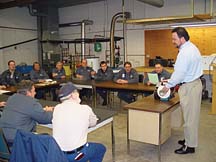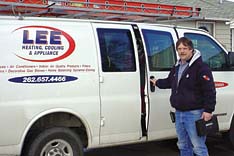
Just how far are contractors willing to go in the name of customer service? Are they willing to send somebody out at all hours of the day or night to fix a problem?
This issue came up last year in The News, when it was suggested that maybe 24-hour service hasn't been the best thing that's ever happened to the HVAC industry. Some said that it's hard enough to retain qualified technicians without asking them to work the night shift. Others disagreed, stating that being in the service business means you have to be available on demand.
Even among companies that offer 24-hour service, there are differences. Some companies may advertise their round-the-clock availability, yet they're slow to answer calls, particularly in bad weather or on holidays. Other companies, such as those profiled here, believe that prompt attention is merited regardless of the time or day.

Embracing The Night Shift
Deiter Bros. Heating, Cooling, and Security in Bethlehem, Pa., has been offering 24-hour service since 1940. The company specializes in residential retrofit and new commercial design-build and spec projects, in addition to providing maintenance for the residential and commercial markets.James G. Deiter, vice president, said it only seems natural to offer 24-hour service, because mechanical equipment does not fail exclusively between 8 a.m. and 5 p.m. "Below-freezing temperatures can cause a boiler shutdown, and I'd better be there pronto or the customer's pipes might freeze waiting for standard service hours," said Deiter.
He said the same is true with air conditioning, which invariably breaks down when taxed by high temperatures. "What if there is a resident with medical conditions who cannot tolerate a baking home? What if guests are scheduled to come? There are so many circumstances that demand the need for 24-hour service. I think it's part of the responsibility that comes with promising the consumer that we are truly a full-service company."
At Deiter Bros., after-hours calls are taken through the answering service and routed to one of the on-call technicians via Nextel. All customers may receive 24-hour service, but service agreement holders are always given priority. In addition, non-agreement customers pay extra for after-hours service, while agreement holders do not.
Deiter said the company does not provide any special incentives for on-call staff. "We're fortunate that we have enough techs who don't mind the night or weekend work. Our business is based in Bethlehem, which has been a major steel-making center for over a century. Night shift, or third shift as it is called around here, has been part of the local culture for generations," said Deiter.
He only sees benefits to offering 24-hour care, noting that the service sets him apart from the competition. "This service distinction is appreciated by the customer willing to pay for total peace of mind, and that's our profile customer."

Service In The Heartland
Lee Heating and Cooling Inc. in Kenosha, Wis., also offers 24-hour service. The company specializes in residential retrofit, service, and maintenance, and also offers duct cleaning and IAQ products.Like Deiter Bros., Lee Heating and Cooling has been offering 24-hour service since the company opened its doors.
Craig Rebro, partner/general manager, said round-the-clock service is absolutely necessary "if you're going to have a credible and professional service company. Customers who do business with us and use us as their regular service company need to know we'll be there for them, and that's 24 hours a day, seven days a week, and holidays."
While the technicians don't necessarily like working nights and weekends, Rebro said they take it in stride. The technicians themselves set the rotating after-hours schedule. They decided it would be best to have a technician on call for a week at a time. With 10 service technicians, this usually means a technician only gets the night shift every two months or so.
Lee Heating and Cooling officially closes at 4:30 p.m. After that time, calls are sent to an answering service that allows customers to either leave a nonemergency message or speak with a technician. A third option tells customers how to access the company's Web site for self-help tips.
If a customer opts to speak with a technician, the customer is informed how much it will cost to make an after-hours call. Lee's normal diagnostic fee is $69 during the day. Around 3 p.m., the diagnostic fee goes up to $95. For a true emergency, the diagnostic fee increases to $150. Service agreement customers get priority, and they also get 20 percent off any repairs that need to be made. After hearing the prices, the customer has the option of determining whether the situation is truly an emergency or if it can wait until normal business hours.
Rebro has a computer at home that tracks all after-hours calls. He checks often to see if the technician on call is getting swamped. If that's the case, he can call in another technician to help out. Rebro also has access to customer histories on his computer, so if a technician needs additional information in the middle of the night, Rebro can give it to him.
The company is a union shop, and Lee technicians receive time-and-a-half when working after hours. The company actually pays its technicians double time when they are on call. "I know it doesn't cover all the grief they have to go through, but at least they get a good wage when they go out and do this," said Rebro.
"I'm really fortunate that the guys we have are a cut above. They get a real sense of satisfaction knowing they've helped a customer, regardless of the time or day."
Publication date: 03/29/2004


